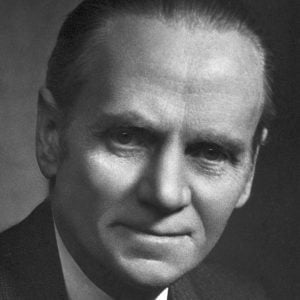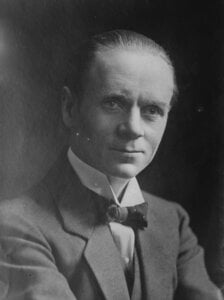Sir Norman Angell
Speed read
Sir Norman Angell was awarded the Nobel Peace Prize for his contribution to the cause of international cooperation and peace.

Full name: Sir Norman Angell (Ralph Lane)
Born: 26 December 1872, Holbeach, United Kingdom
Died: 7 October 1967, Croydon, United Kingdom
Date awarded: 10 December 1934
War does not pay
Author and journalist Norman Angell received the Nobel Peace Prize primarily for his book The Great Illusion. Published in 1910, it sold over two million copies and was translated into 25 languages. Angell analyzed the essence of war and determined that even for the victor, war had become counterproductive to a nation’s quest for prosperity. He believed that the expansion of free trade would create greater dependency among nations and promote development in a peaceful climate. Angell did not believe that armed conflict was unavoidable because humans were violent by nature. Cannibalism and slavery had been abolished in civilized nations, and he was convinced that war could also become a thing of the past. Better education would ensure that reason would win out in the end.
”The conception that we can only protect ourselves if we are prepared to protect others surely ought to belong to the nursery stage of social education.”
Norman Angell, Nobel Lecture, 12 June 1935.
Norman Angell as peace activist
Angell was convinced that information and education were fundamental to peace efforts. He travelled extensively, giving lectures in the United Kingdom, the USA and Germany, and establishing peace associations and discussion clubs. He also contributed to the enlightenment of the general public by writing books for laypeople on unemployment and monetary policy.
”Few people, if any, have done as much as Sir Norman to remove "the splint of the goblin looking-glass" in our eyes, to clear away the mists which prevent us from seeing the road we should travel.”
Christian Lous Lange, Presentation Speech, 10 December 1933.

”Sir Norman Angell’s writings, denouncing the vicious errors of narrow nationalism and exposing the futility of modern war, have been among the most potent factors in the rousing of public attention.”
British newspaper Manchester Guardian, 11 December 1934.
Learn more
Ralph Norman Angell Lane was one of six children of Thomas Angell Lane and Mary (Brittain) Lane ...
Nobel Prizes and laureates
Six prizes were awarded for achievements that have conferred the greatest benefit to humankind. The 14 laureates' work and discoveries range from quantum tunnelling to promoting democratic rights.
See them all presented here.
